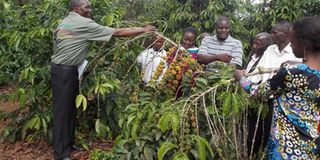Uganda as coffee producer can’t ignore climate change

Farmers in Kyazanga, Lwengo District discuss coffee production on their farm. Uganda could lose the coffee crop if it does not mitigate climate change effects. Photo by Michael J. Ssali
By the time of writing this column late last week, most of Masaka sub-region had not yet received the heavy rains that normally start at the beginning of September.
Weekly short showers lasting about two or three minutes are what the region has so far got for rainfall.
Masaka is one of Uganda’s most important coffee producing districts and the farmers are worried that the rain shortage will compromise the crop quality of the entire November/December harvest. Media reports from the other coffee growing regions of the country do not sound any different.
Our leaders have in the recent years been emphasising the importance of coffee production to our economy. We have seen distribution of potted coffee seedlings to peasant farmers for planting becoming common practice, never mind even if it has often resembled voter bribery.
Value of coffee to Uganda’s economy
Coffee accounts for between 20 and 30 per cent of our foreign exchange earnings and it provides direct or indirect employment to over five million people in the country.
However, on May 28, Alessandro Craparo, a research fellow, International Institute of Tropical Agriculture, University of the Witwatersrand, Johannesburg, came up with the warning: “Coffee lovers beware, climate change may affect your brew. We have known for some time that coffee is a climate-sensitive crop. Now we have the first global evidence that increasing minimum, or night-time, temperatures are having the hardest impact on your daily brew.
A warmer world with soaring day time temperatures has been linked to the decline of many plant and animal species. Unless climate change is mitigated, or farmers find ways to adapt, the future for many crops including coffee looks bleak.”
Coffee is said to be the world’s second most traded commodity after oil. Uganda which recently discovered oil is Africa’s biggest coffee producer after Ethiopia and 10th in the world.
So given our expected revenue from oil, why not plan serious investment in climate mitigation measures such as laying water pipes from our natural water sources to the coffee growing regions and the other parts of the country thriving on rain fed agriculture?
E-mail: [email protected]




